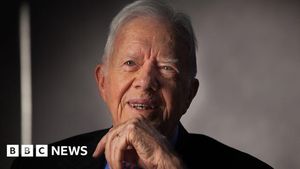International responses are pouring in, as the world grapples with the ramifications of former President Donald Trump’s controversial approach to peace negotiations involving Ukraine and Russia. Reports indicate increasing skepticism about Trump's capacity to facilitate genuine peace talks, raising alarms among European leaders who fear compromises on Ukraine's territorial integrity.
Since Trump’s electoral victory, there have been discussions surrounding potential peace negotiations aimed at resolving the costly conflict. Trump, known for his desire to quickly extricate the US from foreign entanglements, asserted he could end the war even before taking office, according to Voice of America. On the surface, this optimism seems appealing, yet experts quickly point out the harsh realities of the Russian-Ukrainian conflict.
Jeffrey Mankoff, a senior associate with the Center for Strategic and International Studies (CSIS), remarked on the urgency of strengthening Ukraine before any negotiations could yield fruitful results. For the ceasefire talks to progress, he stated, Russian President Vladimir Putin must be compelled to engage sincerely rather than merely pushing for Ukrainian capitulation.
“Strengthening Ukraine and restoring its battlefield advantage are fundamental for meaningful negotiations,” Mankoff stated. “The Kremlin must be made to realize its assumption of time being on its side is flawed, and acting now may yield significantly more favorable outcomes for them than waiting another six months.”
While Trump posits himself as a potential peacemaker, experts like Michael Kimmage, director of the Kennan Institute at the Wilson Center, argue against unrealistic expectations of diplomacy. He cautioned against treating the conflict merely as something to negotiate, emphasizing the complex international dynamics at play. The ability of the West to contain Russian influence is considerably hampered today due to Chinese support for Moscow—a factor absent during the Cold War.
Maria Snegovaya, another CSIS expert, pointed out significant Western miscalculations concerning Russia's ambitions. She argued, “Western leaders failed to see the Kremlin's revitalized pursuit of great power status following their initial post-Soviet assumptions of Russian democratization. This misunderstanding has led to unrealistic hopes for restoring cooperation or trade relations with Moscow.”
Particularly, Snegovaya emphasized the erroneous belief among Western policymakers who thought economic interests would take precedence over Russia's national ambitions. Instead, she implies the opposite has occurred, noting the tie between European politicians and Russia, which complicates the situation even more.
The situation intensifies when viewed through the lens of European responses to Trump’s strategies. Columnist Lee Hoxteder of The Washington Post has described Trump’s approach as self-sabotaging due to his reluctance to bolster Kyiv's defense or bolster NATO ties, which many see as necessary for sustainable peace efforts. “Trump does not want to offer additional aid to Ukraine, considering defending Ukraine as primarily Europe’s responsibility,” Hoxteder noted.
This European perspective indicates growing negotiations concerning the formation of Ukrainian defense forces involving contributions from nations such as Britain, France, the Netherlands, and the Baltics. The discussion exemplifies Europe’s readiness to take actionable steps, though many recognize it cannot single-handedly deter Russian advances without substantive US support.
Czech Foreign Minister Jan Lipavský also reiterated the importance of Europe asserting its conditions for any negotiations with Russia, stating unequivocally: “We must force Putin to accept Zelenskyy for negotiations and as the president of a sovereign nation.” This assertion highlights the necessity for recognition of Ukraine’s sovereignty—an element often overlooked by Russian leadership.
Lipavský emphasized the dangers of falling for Russia's narrative, which seeks to undermine the legitimacy of the Ukrainian government. He called this tactic “a trap,” insisting on the imperative of acknowledging Ukraine's elected leaders during any discussion about peace.
Similarly, Trump has demonstrated his eagerness to see the conflict come to a swift conclusion, yet observers note his approach could undermine the credibility of Ukraine on the world stage if not executed with caution. “It’s not enough to simply call for peace,” Mankoff emphasized, “Without reinforcement, ceasefire negotiation becomes meaningless.”
Given the geopolitical stakes and the long shadow of historical tensions, experts predict significant challenges persist—the prospect of durable peace remains tenuous. Mankoff noted, "Deterring Russia is not just immediate; it’s long-term, possibly spanning generations.” Despite hopes of swift resolutions, this sentiment echoes across many international discussions.
While Trump sought lower oil prices as part of his peace strategy, there needs to be clearer communication surrounding America’s role moving forward. The call for immediate negotiations might be compelling, but the intrinsic realities are more complicated than mere rhetoric. The coming months will significantly influence not only Ukraine’s stability but the broader alignment of international diplomacy concerning Russia.
Now, as the world watches closely, the handling of these negotiations, whether through direct talks or conditional offers, will undoubtedly shape the future of Eastern European geopolitics.



